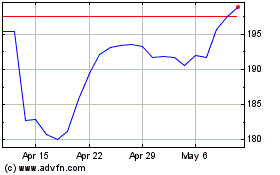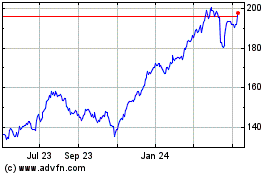By Sara Castellanos
JPMorgan Chase & Co. sees potential in using quantum
computing as a way to significantly speed up financial
calculations, but it is still years away from deploying the
technology.
Since late 2017, the bank has been collaborating with
researchers at International Business Machines Corp. to experiment
with quantum computing. JPMorgan has seen some minor successes,
including one that proves, in theory, that quantum computing can
radically speed up certain financial models.
But Ning Shen, managing director in quantitative research at
JPMorgan's corporate and investment bank, said the technology will
take several years to mature, in part because the hardware required
is extremely complex and adapting and creating new quantum-based
algorithms will take time.
"You need a lot of knowledge, a lot of understanding before you
really get to any real applications," Mr. Shen said.
Experts say quantum computing can be orders of magnitude more
powerful than traditional computers. By harnessing the properties
of quantum physics, quantum computers have the potential to sort
through a vast number of possibilities in nearly real time to come
up with a probable solution. While traditional computers store
information as either 0s or 1s, quantum computers use quantum bits,
or qubits, which represent and store information as both 0s and 1s
simultaneously.
Timelines regarding when companies will start to see measurable
business value from quantum computing vary from about three years
to a decade, but that's not stopping companies such as JPMorgan
from early experiments.
By 2023, 20% of organizations, including businesses or
governments, are expected to budget for quantum-computing projects,
up from less than 1% in 2018, according to Gartner Inc.
Lori Beer, JPMorgan's global chief information officer, said in
2017 that the bank began experimenting with quantum computing to
understand how it would affect the company and its customers.
"We're optimistic that this is a core capability we need to think
about for the long term, " she said back then.
Mr. Shen now oversees a working group on quantum computing that
includes employees from JPMorgan's corporate and investment bank,
asset and wealth management, and the consumer and community
bank.
His team has been running tests via the cloud on IBM's 20-qubit
machine, suitable for small-scale experiments. Mr. Shen says using
quantum computing to speed up computationally intensive
option-pricing calculations is promising.
A computational algorithm known as Monte Carlo is used to
calculate the theoretical value of an option, or a contract that
gives individuals the right to buy or sell an underlying asset at a
specific price and time.
These types of calculations can be time-consuming for
traditional computers, which can take hours to compute option
prices and risks for a large portfolio of complex trades, Mr. Shen
said.
The team's experiments have proved that, in theory, a scalable,
commercial-grade quantum computer could run similar calculations
using quantum computing-based algorithms in seconds. "It [can] save
us many hours and then we can change the business model
completely," Mr. Shen said.
But first, quantum computers need to overcome problems related
to error mitigation and quality of qubits, tasks that IBM has said
it is working on to commercialize the technology. Qubits are
delicate and easily disrupted by changes in temperature, noise,
frequency and motion, which can derail a calculation.
Another area of opportunity involves using quantum computers to
perform risk-assessment calculations in real time instead of the
hours or days it can take for classical computers, Mr. Shen said.
IBM has said it has developed quantum algorithms that could be used
to significantly speed up risk assessments associated with, for
example, investment portfolios, when commercial-grade quantum
computers are available.
IBM is collaborating with more than 60 companies, national
laboratories and academic institutions to experiment with its
early-stage quantum-computing technology via the cloud.
Big companies are experimenting with the technology now because
they understand the deep correlation between computation and
business value, said Dario Gil, IBM's director of research.
It will likely take years to develop the right quantum
algorithms and applications for this next-generation computing
technology, he said. Companies, though, are already seeing business
impact through early experimentation, Mr. Gil said. "The
commercialization path to quantum, and the implication to the
industry, is going to be a continuum, and it has already started,"
he added.
Write to Sara Castellanos at sara.castellanos@wsj.com
(END) Dow Jones Newswires
June 11, 2019 14:03 ET (18:03 GMT)
Copyright (c) 2019 Dow Jones & Company, Inc.
JP Morgan Chase (NYSE:JPM)
Historical Stock Chart
From Mar 2024 to Apr 2024

JP Morgan Chase (NYSE:JPM)
Historical Stock Chart
From Apr 2023 to Apr 2024
